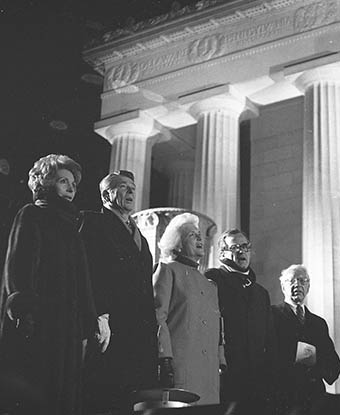Last updated: December 21, 2021
Person
George Herbert Walker Bush

NPS Photo
Born to a wealthy family in Massachusetts in 1924, George H. W. Bush was a decorated Navy fighter pilot in World War II, flying 58 combat missions. Shot down by Japanese anti-aircraft fire over the Pacific and rescued by an American submarine, he received the Distinguished Flying Cross for his bravery in action. When he returned home from the war, he married the former Barbara Pierce, whom he had met as a student at Phillips Academy, and enrolled in Yale University. Graduating in 1948 as a member of Phi Beta Kappa, he entered the oil business as a sales clerk but soon started his own independent oil development company. As his business prospered, he moved to a larger house in Midland, Texas, in 1955 and to Houston four years later. He left active management of his company in 1966.
That same year, Bush began the first of his two terms as a member of the US House of Representatives, following his father into politics. Unsuccessful in two campaigns for the Senate, Bush next served in a series of high-level appointed positions, including ambassador to the United Nations, chairman of the Republican National Committee, chief of the U.S. Liaison Office to the People’s Republic of China, and director of the Central Intelligence Agency. After challenging Ronald Reagan for the Republican presidential nomination, he accepted the vice presidential nomination in 1980. Vice President Bush had a large role in both foreign and domestic dealings. Eight years later he won the presidential nomination and defeated Democrat Michael Dukakis in the 1988 election.
His international experience as vice president and diplomacy smoothed the way, aiding the relatively peaceful transition from the Cold War into a new era of international relations. He sent American troops into Panama to overthrow the corrupt regime of General Manuel Noriega. Bush put together an international coalition to oppose Iraqi dictator Saddam Hussein when he invaded Kuwait. The dramatic allied victory in Operation Desert Storm was a high point of Bush’s presidency. Domestically, Bush supported the Clean Air Act and signed the Americans with Disabilities Act.
A faltering economy, rising violence in the nation’s cities, and high budget deficits hurt him in the 1992 election, which he lost to Democrat Bill Clinton.
President Bush was an ardent supporter of the national parks. During his administration, 14 new national parks were created, and he broke ground for the Korean War Veterans Memorial in Washington. He signed the Everglades National Park Protection and Expansion Act, adding nearly 110,000 acres to the park, and visited Yellowstone National Park in 1989 to survey the damage from the devastating wildfires the previous year. President and Mrs. Bush visited more than a dozen parks during his administration. A World War II veteran, President Bush spoke at the USS Arizona Memorial on December 7, 1991, the 50th anniversary of the attack on Pearl Harbor, and at the dedication of the World War II Memorial (presided over by his son, President George W. Bush) in 2004. The Midland, Texas, home in which George H.W. and Barbara Bush and their family lived from 1952 to 1955 is listed in the National Register of Historic Places.
George and Barbara (1925–2018) Bush were dedicated to their family and are survived by five children: George Walker, John Ellis "Jeb," Neil, Marvin, and Dorothy "Doro"; a daughter, Robin, died of leukemia in 1953 at age three. They often gathered for family get-togethers, spending time with children, grandchildren, and extended family in Kennebunkport, Maine.
On November 30, 2018, George Herbert Walker Bush passed away at his home in Houston, Texas.
